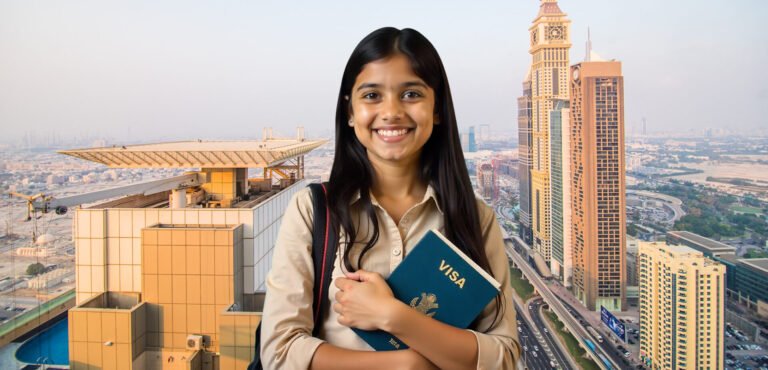Study in Dubai 2026 – Affordable Dream or Costly Mistake
Study in Dubai 2026 – Affordable Dream or Costly Mistake
Dubai has emerged as a global education hub, attracting students from around the world with its futuristic vision and world-class institutions. As we approach 2026, many students are asking: Is Study in Dubai 2026 an affordable dream or a costly mistake? This comprehensive guide examines the reality of studying in this dynamic emirate.
With branch campuses of renowned international universities, state-of-the-art facilities, and a multicultural environment, Dubai offers unique educational opportunities. However, the cost of education and living expenses require careful consideration. Let's explore whether Study in Dubai aligns with your academic goals and budget.
Table of Contents
- Dubai's Education Landscape: An Overview
- Types of Universities in Dubai
- Top Educational Institutions in Dubai
- Most Popular Programs and Emerging Fields
- Study Abroad Cost for Dubai: Complete Analysis
- Scholarships in Dubai: Funding Your Education
- Admission Process and Requirements
- Student Visa Requirements for Dubai
- Working While Studying in Dubai
- Study in Dubai for Indian Students: Special Considerations
- Student Accommodation in Dubai
- Living Expenses and Lifestyle Costs
- Career Opportunities After Graduation
- Dubai vs Other Study Destinations
- Money-Saving Tips for Students in Dubai
- Conclusion: Making the Right Decision
- Useful Resources
- Frequently Asked Questions
Dubai's Education Landscape: An Overview
Dubai has transformed itself into a premier education destination in the Middle East, with significant investments in higher education infrastructure and quality assurance. The emirate's strategic vision aims to establish itself as a knowledge-based economy, attracting international students through diverse educational offerings.
The Knowledge and Human Development Authority (KHDA) regulates private education in Dubai and ensures quality standards across institutions. According to KHDA reports, Dubai hosts over 30 international university branch campuses, making it one of the largest concentrations of international higher education providers globally.
Dubai's education sector has grown exponentially, with student numbers increasing by 40% over the past five years. The emirate's focus on innovation and technology is reflected in its educational offerings, particularly in fields like artificial intelligence, renewable energy, and business management.
The multicultural environment in Dubai provides a unique advantage for international students. With over 200 nationalities represented, students gain exposure to diverse perspectives and cultures, preparing them for global careers. The Dubai Government's official portal highlights education as a key pillar of the emirate's development strategy.
Types of Universities in Dubai
Understanding the different types of higher education institutions in Dubai is crucial for making an informed decision about your Study Abroad journey.
International Branch Campuses form the backbone of Dubai's higher education system. These include prestigious institutions like the University of Birmingham, Middlesex University, and Heriot-Watt University, which have established campuses in Dubai International Academic City (DIAC) or Dubai Knowledge Park (DKP).
Local Private Universities, such as the University of Dubai and Al Ghurair University, offer programs tailored to the regional market needs. These institutions often have strong industry connections within the UAE and GCC region.
Specialized Institutions focus on specific fields like medicine, engineering, or business. Examples include the Mohammed Bin Rashid University of Medicine and Health Sciences and the American University in the Emirates.
According to the Dubai International Academic City website, DIAC alone hosts over 25 universities from 10 different countries, offering more than 500 academic programs to students from 159 countries.
Need Help Choosing the Right Dubai University?
Our expert counselors at Vibedu Study Abroad can help you navigate the diverse educational landscape in Dubai and select the perfect institution based on your academic background and career aspirations.
Get Free CounsellingTop Educational Institutions in Dubai
Dubai hosts several prestigious institutions that offer world-class education with international recognition. Here are some of the top choices for students considering Study in Dubai 2026.
The University of Birmingham Dubai is a Russell Group university offering the same quality education as its UK campus. It's particularly strong in business, engineering, and computer science programs.
Middlesex University Dubai was one of the first UK universities to establish a campus in Dubai and offers a wide range of undergraduate and postgraduate programs with UK accreditation.
The Heriot-Watt University Dubai is renowned for its engineering, business, and fashion programs. The university has strong industry connections and offers excellent placement opportunities.
The American University in Dubai offers American-style education with accreditation from the Southern Association of Colleges and Schools Commission on Colleges (SACSCOC).
Other notable institutions include the University of Wollongong in Dubai, Manipal Academy of Higher Education Dubai Campus, and Amity University Dubai, each offering unique strengths and specializations.
Most Popular Programs and Emerging Fields
Dubai's educational offerings reflect the emirate's economic priorities and global trends. Certain programs have gained particular popularity among international students.
Business and Management programs remain the most popular choice, with MBA programs attracting significant numbers of international students. Specializations in international business, finance, and marketing are particularly relevant given Dubai's status as a global business hub.
Engineering and Technology programs have seen substantial growth, especially in fields like civil engineering, mechanical engineering, and computer science. The UAE's focus on infrastructure development and digital transformation drives demand for these qualifications.
Hospitality and Tourism Management programs leverage Dubai's position as a global tourism destination. According to the Dubai Department of Tourism and Commerce Marketing, the emirate attracted over 16 million international visitors in 2023, creating abundant opportunities in this sector.
Emerging fields include Artificial Intelligence and Data Science, supported by the UAE's National AI Strategy 2031. Renewable Energy and Sustainability programs are also gaining traction as the UAE transitions toward green energy.
Study Abroad Cost for Dubai: Complete Analysis
Understanding the financial commitment is crucial when planning your Study Abroad cost for Dubai. While Dubai offers world-class education, it comes with significant expenses that require careful budgeting.
Tuition fees in Dubai vary widely depending on the institution and program. International branch campuses typically charge between AED 40,000 and AED 120,000 (approximately $11,000 to $33,000) per year for undergraduate programs. Postgraduate programs range from AED 55,000 to AED 150,000 ($15,000 to $41,000) annually.
Living expenses in Dubai can be substantial. According to the Numbeo cost of living index, a single person's monthly costs average AED 4,000 ($1,090) excluding accommodation. When including housing, this figure can rise to AED 7,000-10,000 ($1,900-2,700) per month.
| Expense Category | Estimated Annual Cost (AED) | Estimated Annual Cost (USD) | Notes |
|---|---|---|---|
| Undergraduate Tuition | AED 40,000 - 120,000 | $11,000 - $33,000 | Varies by university and program |
| Postgraduate Tuition | AED 55,000 - 150,000 | $15,000 - $41,000 | MBA programs at higher end |
| Accommodation | AED 30,000 - 70,000 | $8,200 - $19,000 | University housing cheaper |
| Food & Groceries | AED 15,000 - 25,000 | $4,100 - $6,800 | Cooking at home saves significantly |
| Transportation | AED 5,000 - 10,000 | $1,400 - $2,700 | Monthly passes available |
| Utilities & Internet | AED 8,000 - 15,000 | $2,200 - $4,100 | Often included in accommodation |
| Study Materials | AED 3,000 - 7,000 | $800 - $1,900 | Textbooks, supplies, etc. |
| Personal Expenses | AED 12,000 - 20,000 | $3,300 - $5,400 | Entertainment, clothing, etc. |
| Total Annual Cost | AED 117,000 - 267,000 | $32,000 - $73,000 | Varies based on lifestyle choices |
While these costs might seem daunting, numerous Scholarships in Dubai and financial aid options are available, which we'll explore in the next section.
Scholarships in Dubai: Funding Your Education
Numerous scholarship opportunities exist to help international students manage the costs of studying in Dubai. These Scholarships in Dubai can significantly reduce the financial burden and make quality education more accessible.
University-specific scholarships are the most common type of financial aid. Most institutions in Dubai offer merit-based scholarships for high-achieving students. For example, the Zayed University Scholarship Program offers discounts ranging from 15% to 50% on tuition fees based on academic performance.
Government scholarships include the UAE Ministry of Education Scholarships for outstanding international students. The Dubai Government also offers various educational grants through different departments and initiatives.
Corporate scholarships are offered by major companies operating in Dubai. Organizations like Emirates, Emaar, and DP World provide scholarships for students pursuing fields relevant to their industries.
Country-specific scholarships are available for students from particular regions. Indian students can explore options like the Indian Council for Cultural Relations (ICCR) scholarships and various corporate scholarships from Indian companies with operations in the UAE.
Get Free CounsellingAdmission Process and Requirements
The admission process for Dubai universities varies by institution but generally follows a similar pattern. Understanding this process is crucial for successful Study in Dubai 2026 planning.
Most universities in Dubai require completion of secondary education equivalent to 12 years of schooling for undergraduate programs. For postgraduate programs, a relevant bachelor's degree with a minimum GPA is typically required.
English language proficiency is mandatory for most programs, with minimum IELTS scores typically ranging from 5.5 to 6.5 or equivalent TOEFL scores. Some universities offer conditional admission with English language preparation courses for students who don't meet the language requirements.
Application documents usually include academic transcripts, passport copies, proof of English proficiency, statement of purpose, letters of recommendation, and a CV. Some programs may require additional materials like portfolios for creative fields or entrance exams for specific disciplines.
According to the Dubai Government Education Portal, application deadlines vary by institution but generally fall 3-6 months before the start of each semester. Early application is recommended as popular programs fill quickly.
Student Visa Requirements for Dubai
International students require a student visa to study in Dubai, which is typically sponsored by the educational institution. Understanding the visa requirements and process is essential for planning your studies.
According to the General Directorate of Residency and Foreigners Affairs (GDRFA), key requirements include an acceptance letter from a recognized educational institution, proof of financial capability, comprehensive health insurance, and a valid passport with at least six months validity.
The student visa application process is typically handled by the university's international student office. Required documents usually include passport copies, passport-sized photographs, academic documents, proof of tuition fee payment, and medical fitness certificate.
Student visas are generally valid for one year and can be renewed annually for the duration of the study program. The Amer service centers across Dubai facilitate visa applications and renewals.
It's important to note that student visa regulations can change, so checking the latest requirements with your chosen university and the GDRFA website before applying is recommended.
Working While Studying in Dubai
International students in Dubai have limited opportunities to work part-time during their studies, which can help offset living expenses and gain valuable work experience.
According to the Ministry of Human Resources and Emiratisation (MOHRE), international students can work part-time under certain conditions. The university must endorse the part-time work, and students cannot work more than 15 hours per week during semesters or 40 hours during vacations.
Popular student jobs include positions in retail, hospitality, university departments (as research or teaching assistants), and internships related to their field of study. Many universities have dedicated career services that help students find suitable employment opportunities.
The Bayt.com job portal and university career centers are excellent resources for finding part-time work. It's important to balance work commitments with academic responsibilities to ensure successful study outcomes.
Study in Dubai for Indian Students: Special Considerations
Dubai offers specific advantages that make it particularly appealing for Indian students considering Study in Dubai for Indian Students.
The large Indian community in Dubai helps new students adapt more easily. With Indians comprising approximately 30% of Dubai's population, there are established communities, cultural associations, grocery stores selling Indian products, and numerous restaurants serving authentic Indian cuisine.
Geographical proximity to India means shorter travel times and lower flight costs compared to Western destinations. The minimal time difference (1.5 hours during standard time) also makes communication with family in India more convenient.
According to the Indian Consulate in Dubai, over 50,000 Indian students are currently pursuing higher education in the UAE, with numbers growing steadily each year.
Cultural similarities and the presence of Indian festivals and traditions make the transition smoother. Many Indian banks and businesses operate in Dubai, facilitating financial transactions and providing familiar services.
Student Accommodation in Dubai
Finding suitable accommodation is a crucial aspect of planning your study in Dubai. Various options are available, each with different costs and benefits.
University-owned accommodation is often the most convenient option for international students. These residences are typically located on or near campus and include utilities in the rent. According to the Property Finder website, on-campus accommodation costs between AED 25,000 and AED 45,000 annually depending on the university and room type.
Private shared apartments are another popular option, where students share apartments in residential areas like International City, Discovery Gardens, or Jumeirah Village Circle. This can be more affordable but requires more effort to arrange.
Homestays, where students live with local families, offer cultural immersion but are less common in Dubai. Service apartments provide another alternative, offering hotel-like services with kitchen facilities.
It's recommended to secure accommodation before arriving in Dubai, especially for the September intake when demand is highest. Many universities guarantee accommodation for first-year international students who apply by specified deadlines.
Living Expenses and Lifestyle Costs
Understanding the complete picture of living expenses in Dubai is essential for accurate budgeting. While Dubai offers a high-quality lifestyle, it comes with corresponding costs.
Transportation costs can vary significantly based on your choices. The Dubai Roads and Transport Authority (RTA) offers student discounts on public transportation. Monthly passes for buses and metro cost approximately AED 350-500, while taxi fares can add up quickly.
Food expenses depend largely on your eating habits. Cooking at home using groceries from supermarkets like Carrefour or Lulu can cost AED 800-1,500 monthly, while eating out regularly can easily double or triple this amount.
Utilities including electricity, water, and internet typically cost AED 600-1,000 monthly if not included in accommodation. Mobile phone plans range from AED 100-300 monthly depending on data requirements.
Entertainment and leisure activities can be expensive in Dubai, but student discounts are available at many venues. Budgeting for these expenses is important to maintain a balanced lifestyle while studying.
Career Opportunities After Graduation
Dubai offers excellent career opportunities for graduates, particularly in sectors aligned with the emirate's economic priorities. Understanding these opportunities is crucial for long-term planning.
According to the Dubai Government Portal, key growth sectors include technology, tourism, logistics, renewable energy, and healthcare. Graduates with qualifications in these fields have strong employment prospects.
The UAE's graduate visa scheme allows international students to remain in the country for up to 12 months after graduation to seek employment. This provides valuable time to find suitable job opportunities without immediate pressure to leave the country.
Networking opportunities abound in Dubai, with numerous industry events, career fairs, and professional associations. Universities often have strong industry connections and career services that facilitate graduate employment.
Salary expectations vary by field and experience level. According to the Hays Salary Guide for the UAE, fresh graduates can expect starting salaries ranging from AED 8,000 to AED 15,000 monthly depending on their field of study and the employer.
Dubai vs Other Study Destinations
When considering Study Abroad options, it's helpful to compare Dubai with other popular destinations to make an informed decision.
Compared to the USA and UK, Dubai offers more affordable tuition fees in many cases, though living costs can be comparable to major cities in these countries. The visa process is generally simpler in Dubai, and geographical proximity to India is a significant advantage.
Versus other Middle Eastern destinations like Qatar or Saudi Arabia, Dubai offers a more liberal social environment and greater exposure to international culture and business practices. The employment opportunities for graduates are also more diverse in Dubai.
Compared to Southeast Asian destinations like Singapore or Malaysia, Dubai offers higher potential salaries after graduation but with higher living costs. The multicultural environment is similar, but Dubai's focus on innovation and technology is more pronounced.
Against European destinations like Germany or France, Dubai offers English-medium education without language barriers, but lacks the Free Education in Dubai options available in some European countries. The career opportunities in Dubai are more focused on specific industries like business, technology, and hospitality.
Still Deciding Between Study Destinations?
Our experienced counselors at Vibedu Study Abroad can provide comparative analysis of different study destinations based on your academic background, career goals, and budget to help you make the best choice.
Get Free CounsellingMoney-Saving Tips for Students in Dubai
While studying in Dubai involves significant expenses, numerous strategies can help students manage their budgets effectively and reduce overall costs.
Choosing university accommodation or shared apartments in less expensive areas can save thousands of dirhams annually. Areas like International City, Discovery Gardens, and Al Nahda offer more affordable housing options compared to premium locations.
Cooking at home rather than eating out can reduce food expenses by 50% or more. Shopping at discount supermarkets like Nesto, Union Coop, or Lulu Hypermarket instead of premium stores can further reduce grocery bills.
Utilizing student discounts is crucial. The International Student Identity Card (ISIC) provides discounts on transportation, entertainment, and shopping across Dubai. Many attractions offer student pricing with valid university ID.
Using public transportation instead of taxis can save significant amounts. The RTA offers student Nol cards with discounted fares on buses, metro, and trams. Walking or cycling for short distances in cooler months can also reduce transportation costs.
Conclusion: Making the Right Decision
Studying in Dubai represents a significant investment in your future, offering world-class education in a dynamic global hub. As we've explored, Study in Dubai 2026 can be both an affordable dream and a costly mistake, depending on your choices and circumstances.
The key to making Dubai an affordable dream lies in careful planning, securing scholarships, choosing cost-effective accommodation and lifestyle options, and maximizing the career opportunities available after graduation. With proper preparation, the investment can yield excellent returns through quality education and global career prospects.
For Indian students specifically, Dubai offers unique advantages including geographical proximity, cultural familiarity, and a large Indian community. These factors can significantly ease the transition and enhance the overall study experience.
Ultimately, the decision to study in Dubai should align with your academic goals, career aspirations, and financial capacity. With thorough research and strategic planning, Dubai can indeed be an affordable dream rather than a costly mistake.
Final Verdict
Dubai offers a unique blend of quality education, multicultural environment, and career opportunities that can justify the investment for many students. While costs are substantial, strategic planning and utilization of available resources can make it an affordable and rewarding choice. The decision ultimately depends on your specific circumstances, goals, and willingness to maximize the opportunities Dubai provides.
Useful Resources for Studying in Dubai
- Knowledge and Human Development Authority (KHDA) - Education regulator in Dubai
- Dubai International Academic City - Largest free zone dedicated to higher education
- General Directorate of Residency and Foreigners Affairs - Official visa and immigration information
- UAE Ministry of Education - Federal education authority
- Indian Consulate in Dubai - Official diplomatic mission for Indian students
- Dubai Government Education Portal - Official guide to education in Dubai
- International Student Identity Card - Global student discount program
- Dubai Roads and Transport Authority - Public transportation information
Frequently Asked Questions
No, Free Education in Dubai is generally not available for international students. While there are some government scholarships for exceptional students, most international students pay tuition fees. However, numerous scholarship opportunities and financial aid options are available to help reduce costs.
The total Study Abroad cost for Dubai for Indian students typically ranges from AED 117,000 to AED 267,000 (approximately $32,000 to $73,000) per year, including tuition and living expenses. Undergraduate programs cost AED 40,000-120,000 annually for tuition, while postgraduate programs range from AED 55,000-150,000. Living expenses add approximately AED 60,000-120,000 per year.
Yes, degrees from accredited institutions in Dubai are recognized in India and globally. The KHDA ensures quality standards, and many universities in Dubai are international branch campuses of renowned institutions whose degrees are recognized worldwide. The Association of Indian Universities (AIU) recognizes qualifications from KHDA-accredited institutions.
Most universities in Dubai require proof of English proficiency through tests like IELTS (typically 5.5-6.5 overall), TOEFL (61-79), or Pearson PTE Academic (46-58). Some universities may waive this requirement for students who have previously studied in English-medium institutions or offer foundation programs for those who need to improve their English.
Yes, international students in Dubai can work part-time under certain conditions. The university must endorse the part-time work, and students cannot work more than 15 hours per week during semesters or 40 hours during vacations. Popular student jobs include positions in retail, hospitality, university departments, and internships related to their field of study.
Dubai offers good post-study work opportunities through the graduate visa scheme, which allows international students to remain in the country for up to 12 months after graduation to seek employment. Key growth sectors include technology, tourism, logistics, renewable energy, and healthcare. Graduates with qualifications in these fields have strong employment prospects in Dubai's dynamic job market.
Dubai has a desert climate with extremely hot summers (April-October) where temperatures can reach 45°C, and mild winters (November-March) with temperatures around 20-25°C. Indian students from northern regions may find the summer heat challenging initially, but air conditioning is ubiquitous indoors. The winter months are pleasant and similar to pleasant Indian winter weather.
Vibedu Study Abroad offers comprehensive support for students planning to study in Dubai. Our services include university selection guidance, application assistance, scholarship information, visa guidance, pre-departure briefings, and ongoing support during your studies. Our experienced counselors provide personalized advice based on your academic background, career goals, and budget considerations.









